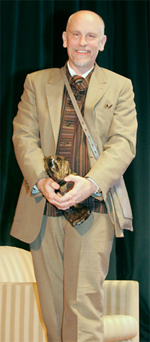Culture.com brings crowd and John Malkovich to Tsai Center
The actor is honored, talks about culture, acting, and success

As the family in Culture.com, Guila Clara Kessous’ one-act tribute to the actor John Malkovich, argues over the dinner table, enormous images of television shows play on a rear wall of the set. There are pictures of a tsunami in a distant part of the world, a vaguely disturbing commercial for laundry detergent (Click here to watch a video of that), and a hilarious hip-hop number about the importance of getting into a good college. The video messages are all about culture — What is it? What’s it good for? What’s it bad for? — and so, of course, is Culture.com, a play that is sometimes funny, sometimes musical, and always provocative. In fact, the script was sufficiently provocative to persuade Cambridge-dweller John Malkovich to attend its sole performance at the Tsai Performance Center on Monday night, after which the actor took the stage and discussed his own notions of culture.
Culture.com, which was performed by Boston University students, uses a combination of media, music, and comic absurdity to challenge popular notions about the definition and the value of culture. As younger children in the play’s comfortably intellectual family fight over which television show to watch, a high-school age daughter studies for her SATs. A recently hired African-American housekeeper serves drinks and mistakenly unlocks the room where a literature-devouring son has spent his entire life. Chaos erupts, and the madness continues, until a woman in the fifth row of the audience stands and asks the actors when the play will end. That will not happen, we are told, until the entire audience recites a poem — the same poem, in unison. The poem, it turns out, is not a poem exactly, but a nursery rhyme: “Twinkle Twinkle Little Star” — the author’s point being that the only poetic work that a cross section of Americans knows well enough to recite is child’s play.
The performance done, Malkovich took a seat onstage and answered questions from Christopher Martin, a College of Arts and Sciences associate professor of English, and playwright Kessous, who said she dedicated her play to Malkovich because his work explores the same sorts of questions as does hers. Asked by Kessous about his idea of culture, Malkovich said he would have to define culture as “a way of satisfying the curiosity that I have.”
“I was recently in Amsterdam,” said Malkovich, who sported a goatee. “And in Amsterdam you have a lot of cultural choices. You can stay in the hotel and watch Finnish porno, which may be quite a sensible choice, or you could go see The Night Watch, which may also be a sensible choice.”
The actor, who lived for 15 years in France before moving to Cambridge, disputed the European conviction that America has no culture. America, he said, simply has a different kind of culture.
“People say this country has no culture,” he said. “But you could also say that there is more culture in Dylan’s “A Hard Rain’s A-Gonna Fall” than there is in some countries.”
Malkovich said the big difference between European and American notions of culture is that Americans tend to be less mindful of their own culture, and that may be because the history of this country is much shorter than the histories of European countries.“In America, culture is more of an elective,” he said. “It’s not a prerequisite to anything.”
Responding to a question about his method of acting, Malkovich said that when he is acting he tries very hard to simply act and not to think about what he is doing. “If you’re acting you can’t be thinking,” he said. “Acting is not about thinking. If you think about it too much, you’re going to be in trouble.”
The internationally famous actor shrugged when asked about his success. “I always think success is mostly luck,” he said. “And I run across so many talented people who have had no luck.”
Culture.com author Guila Carla Kessous is a graduate student completing a Ph.D. in modern foreign languages and literatures under the guidance of Elie Wiesel (Hon.’74), BU’s Andrew W. Mellon Professor in the Humanities, and tutelage of T. Jefferson Kline, associate chair of BU’s modern foreign languages and literatures department. She has taught at BU, the French Library and Cultural Center/Alliance Francaise of Boston and Cambridge, and at Harvard. In January, Kessous received the highest honor in drama issued by the French Ministry of Culture: the State Diploma in Performing Arts. The play was sponsored by the University Professors Program, the CAS Core Curriculum, NEH Distinguished Teaching Professor Christopher Martin, the College of Fine Arts, Pusteblume, and the French Cultural Society. For more information about the play, its cast, and its author, click here.
